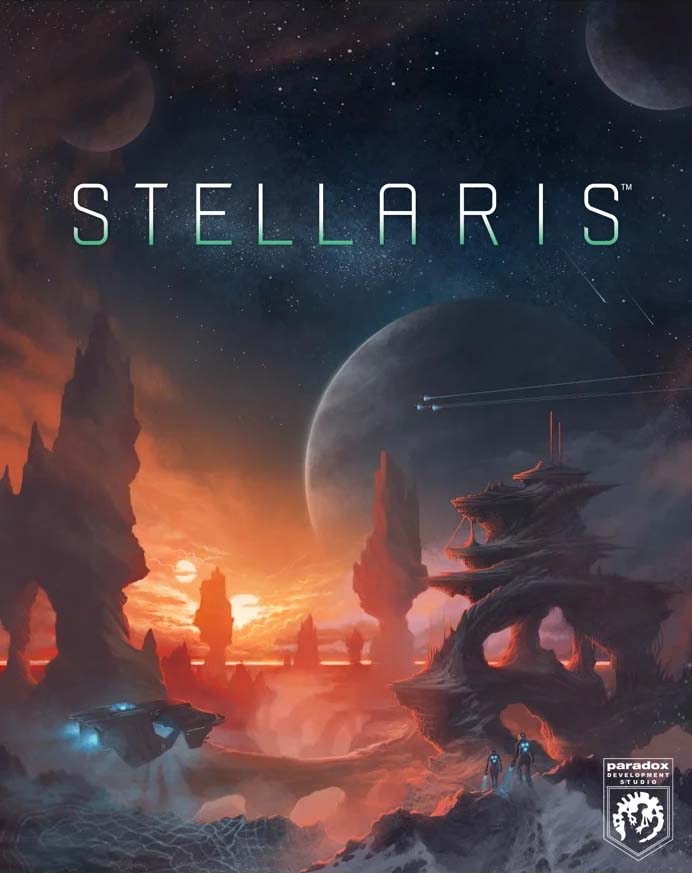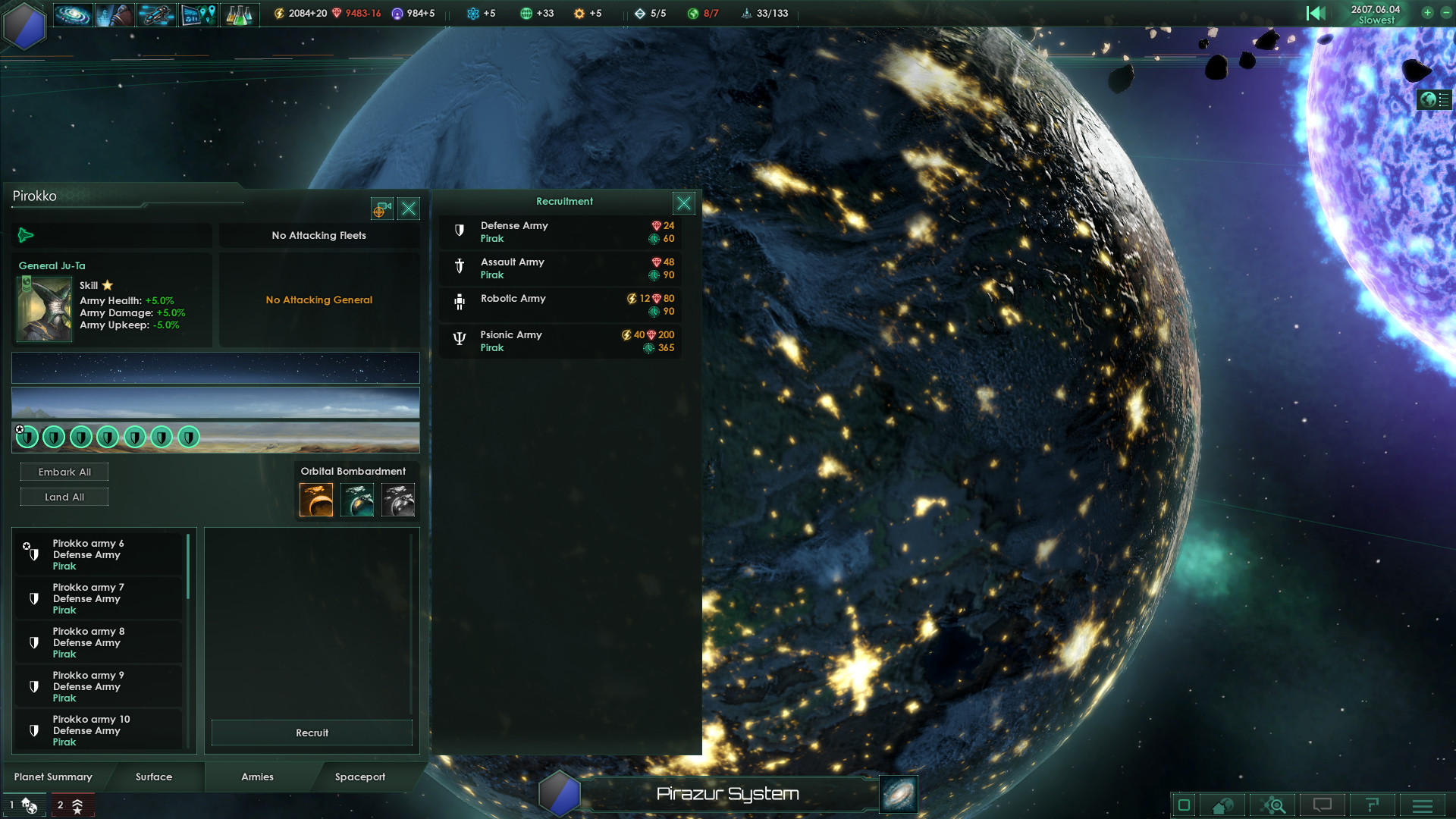But despite the setting’s implicit assumption of conflict, it’s actually possible to play for a surprisingly long time without ever drawing your futuristic saber equivalent.
Something I find appealing, given how many games already cater to our more violent impulses. With «Stellaris», I therefore decided to make a serious attempt to take over the universe in a peaceful manner through bureaucracy and social democracy.
Smooth introduction
You actually have quite a bit of time for this, as the game starts off pretty relaxed. You explore the galaxy, encounter mysterious space phenomena, conduct research, and discover new technologies, all while gradually mapping out the stars.
As your empire expands, you begin to meet other factions.
At this point, the game shifts focus, emphasizing diplomacy and trade. This phase can stretch on for quite a while before you inevitably reach a point where you have to disintegrate someone - or something - to avoid obliteration yourself.
The game offers a rich selection of pre-generated species and factions that you can encounter or choose to play as. Everything from militaristic lizard men to anthropomorphic fungi who knit and live in communes.
But since I wanted to go for a pacifist approach, I felt compelled to build my own faction. My first impulse was to make a space version of my own country: Norway. Since, after all (according to my Facebook feed), we are the best country in the world.
Because that should be the perfect foundation for a hegemony rooted in healthy and sustainable values!
"Norwegian" pacifists
I decided to create a faction of pacifist materialists, focused on avoiding conflict and acquiring properties to eventually build patios on.
I chose a bureaucratic form of government and set my final "ethics slot" to "Xenophobia," which grants a +50% tolerance for slavery, as long as it only involves other species.
Overall, this goes a long way towards describing a people who are peaceful, not particularly religious but hardworking, with a slight touch of racism. Which gives them a lukewarm attitude toward accepting refugees from Syria, whilst being quite open to exploiting underpaid labor from Poland.
Unfortunately, I couldn’t find a leader in the game that resembled our Prime Minister: Erna Solberg.
A nice touch when creating your own factions is that if you don’t play as them, you might later encounter them in the game. Neat :)
But «Stellaris» is about more than just choosing an ideological path and form of governance. You also have to manage your space empire, and for that, you need a user interface capable of displaying a dense amount of information while remaining visually functional.
Simple interface, but a lot to keep track of
And the graphical user interface is probably one of the most impressive aspects of «Stellaris».
It takes quite an effort to get into most grand strategy games, especially for those who haven’t spent a few years immersed in the genre.
As mentioned, there’s a lot to manage, but thanks to a well-designed tutorial and mission-based guidance - and the relatively conflict-free early game - you end up learning to play the game quite naturally just by playing it. So, while «Stellaris» is complex, it’s surprisingly accessible. And you can get the hang of it even if you’ve never touched other games in the genre, like «Europa Universalis» or «Crusader Kings».
However, the interface lacks a bit of muscle once you control more planets than you can mentally track.
Considering this is administration on a galactic scale, with resources counted across entire solar systems, it quickly becomes challenging keeping tabs on your fleet, personnel, resources, and factories as your empire grows.
At a certain point, you just find yourself wishing for periodic reports detailing how much you have of what, and where it’s located - like the kind of status updates middle managers love so much.
Unnecessarily pretty
Another noteworthy aspect of «Stellaris» is that the game looks great, but in a way that is often unnecessary.
There are plenty of beautiful 2D illustrations that help set the mood. The character portraits are well-designed, relatively varied, and are sparingly but tastefully animated.
There are also intricate details on the spaceships - which can be customized - if you zoom in far enough. When you reach the stage where space battles become a reality, the clashes between opposing fleets can be impressive sights to behold.
That is, if you’re zoomed in close enough to actually see them.
Most of the time, however, you won’t be. The game demands that you maintain control of the bigger picture rather than focusing too much on individual units, so you spend the vast majority of your time dealing with abstract representations of most things in the form of icons on the galaxy map. This means the detailed spaceship models and other visual flourishes often become redundant.
Even space battles - which have the potential to be epic showdowns with massive fleets exchanging laser fire and explosions - often end up going unnoticed. Unless you make a specific point of zooming in to witness them.
Epic music
But one aspect you’ll definitely notice is the wonderfully atmospheric music by Andreas Waldetoft. The soundtrack features classical-inspired space opera tracks with lush, ambient synth strings, perfectly complementing the game’s sci-fi setting.
Performance-wise, «Stellaris» runs smoothly even on modest hardware, and it has supported user-generated content from day one.
So if you find yourself growing tired of the original campaign - which is likely, as many of the same events tend to repeat in each playthrough - you’ll have plenty of alternatives to explore. For instance, there’s already a «Warhammer 40K» mod available for those seeking a more ultra-violent approach to galactic domination than mine.






No comments:
Post a Comment